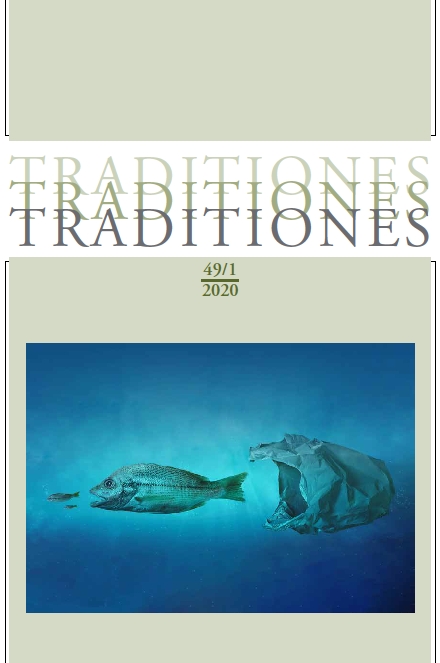Nevidno življenje zavržene hrane
PRIMER GOSPODINJSTEV V LJUBLJANI
DOI:
https://doi.org/10.3986/Traditio2020490106Ključne besede:
odpadki hrane, vzdržnost, etnografija, anketa, LjubljanaPovzetek
V zadnjih letih so odpadki hrane postali pomemben problem, s katerim se ukvarjajo znanstveniki, porabniki in aktivisti. Po podatkih Svetovne banke ljudje zavržejo tretjino hrane, pridelane za prehrano. V Sloveniji je leta 2017 nastalo skoraj 131.800 ton odpadkov oziroma v povprečju 64 kilogramov na osebo. V članku so predstavljeni izsledki raziskave o odpadkih hrane v gospodinjstvih, ki so jo izvedli v Sloveniji in podrobneje v Ljubljani. Avtorja prispevka sta ravnanje z odpadki preučila s kombinacijo kvantitativnih in kvalitativnih pristopov (tj. z anketiranjem in etnografijo). S kombiniranjem pristopov sta skušala pridobiti širšo sliko o ravnanju z odpadki in razložiti, kako, kdaj in zakaj ljudje »pretvorijo« hrano v odpadke.
Prenosi
Literatura
Appadurai, Arjun (ed.). 1986. The Social Life of Things: Commodities in Cultural Perspective. Cambridge University Press.
Douglas, Mary. 1966. Purity and Danger: An Analysis of Concept of Pollution and Taboo. Routledge & Keegan Paul.
Eberl, Uroš, and Radovan Tavzes. 2001. Ravnanje s komunalnimi odpadki MOL. Ljubljana: Municipality of Ljubljana.
Economic Accounts of the European Union. 1998. Panorama of the European Union. Luxembourg: Eurostat.
Evans, David. 2014. Food Waste: Home Consumption, Material Culture and Everyday Life. London: Bloomsbury.
Festinger, Leon. 1957. A Theory of Cognitive Dissonance. Stanford: Stanford University Press.
Gabrys, Jennifer. 2013. Digital Rubbish: A Natural History of Electronics. Ann Arbor: The University of Michigan Press.
Gille, Zsuzsa. 2007. From the Cult of Waste to the Trash Heap of History: The Politics of Waste in Socialist and Postsocialist Hungary. Bloomington and Indianapolis: Indiana University Press.
Harmon-Jones, Eddie, Cindy Harmon-Jones, and Nicholas Levy. 2015. An Action-Based Model of Cognitive-Dissonance Processes. Current Directions in Psychological Science 24 (3): 184–189. https://doi.org/10.1177/0963721414566449.
Hoornweg, Daniel, and Perinaz Bhada-Tata. 2012. What a Waste: A Global Review of Solid Waste Management. Washington: World Bank.
Keuc, Albin et al. 2005. Preprečevanje in zmanjševanje odpadkov v Sloveniji. Ljubljana: Umanotera.
Končan, Katja. 2010. Ločevanje odpadkov v gospodinjstvih – ozaveščenost prebivalstva mestnih občin Ljubljana in Maribor (unpublished BA thesis). Ljubljana: University of Ljubljana, Faculty of Arts.
Laporte, Dominique. 2002. The History of Shit. Boston: MIT Press.
Miller, Daniel. 2001. Home Possessions. Oxford: Berg.
Miller, Daniel. 2010. Stuff. Cambridge: Polity.
Nagle, Robin. 2013. Picking Up: On the Streets and Behind the Trucks with the Sanitation Workers of New York City. New York: Farrar, Straus and Giroux.
Oblak, Erika. 2000. Zero Waste – Priložnost za Slovenijo. Ljubljana: Umanotera.
Podjed, Dan, and Katarina Polajnar Horvat. 2017. Visualising the Invisible Life of Waste. In: Jože Hudales (ed.), Material Culture: How Things Make People (Proceedings). Ljubljana: Publishing House of University of Ljubljana, Faculty of Arts, 25.
Polajnar Horvat, Katarina. 2015. Okolju prijazno vedenje. Ljubljana: ZRC Publishing.
Rathje, William, and Cullen Murphy. 2001. Rubbish! The Archaeology of Garbage. Tucson: The University of Arizona Press.
Rebernik, Dejan. 1999. Prebivalstveni razvoj Ljubljane po 1945. Geografski vestnik 71: 41–60.
Rebernik, Dejan. 2000. Prebivalstveni razvoj po letu 1945. In: Matej Gabrovec and Milan Orožen Adamič (eds.), Ljubljana – geografija mesta. Ljubljana: ZRC Publishing.
Royte, Elizabeth. 2005. Garbage Land: On the Secret Trail of Trash. New York: Little, Brown and Company.
Scanlan, John. 2005. On Garbage. London: Reaktion Books.
Shove, Elizabeth. 2003. Comfort, Cleanliness and Convenience: The Social Organization of Normality. Oxford: Berg Publishers.
Staničić, Damir et al. 2008. Novelacija operativnega programa gospodarjenja z odpadki na območju Mestne občine Ljubljana in osmih primestnih občin za obdobje 2009 – 2013. Ljubljana: Mestna občina Ljubljana.
Strasser, Susan. 1999. Waste and Want: A Social History of Trash. New York: Metropolitan Books.
Šantl, Simona. 2002. Aktualnost sodobnega potrošniškega subjekta (unpublished BA degree). Ljubljana: University of Ljubljana, Faculty of Social Sciences.
Thompson, Michael. 1979. Rubbish Theory: The Creation and Destruction of Value. New York: Oxford University Press.
Uršič, Matjaž. 2017. Critical Reconsideration Of Social And Cultural Elements That Constitute The Creative Ecosystem Of A City: Examples From Slovenia And Japan. Traditiones 46 (1–2): 149–170. DOI: https://doi.org/10.3986/Traditio2017460203.
Prenosi
Objavljeno
Kako citirati
Številka
Rubrike
Licenca

To delo je licencirano pod Creative Commons Priznanje avtorstva-Nekomercialno-Brez predelav 4.0 mednarodno licenco.
Avtorji jamčijo, da je delo njihova avtorska stvaritev, da v njem niso kršene avtorske pravice tretjih oseb ali kake druge pravice. V primeru zahtevkov tretjih oseb se avtorji zavezujejo, da bodo varovali interese založnika ter da bodo povrnili morebitno škodo.
Podrobneje v rubriki: Prispevki






